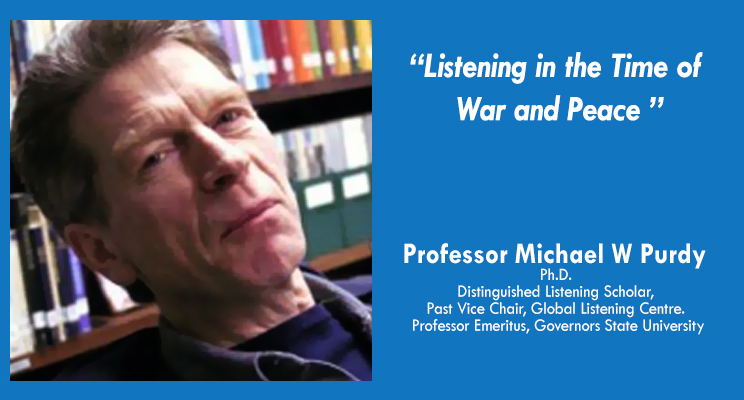
Listening in the Time of War and Peace
Professor Michael W Purdy, Ph.D.
Distinguished Listening Scholar,
Past Vice Chair, Global Listening Centre.
Professor Emeritus, Governors State University
In searching for some thoughts on listening and war, note the wisdom in an October 2003 column written by three-time Pulitzer Prize winning columnist for The New York Times, Thomas Friedman, about how the Iraq war could have been avoided by listening. In an opinion piece in the New York Times Friedman wrote: “We cannot spend so much time talking about our enemies that we forget to listen to our friends, because without them, ultimately, we cannot win either a war of terror-ism or a war of ideas.” (https://www.nytimes.com/2003/10/16/opinion/on-listening.html)
In time of war, we need friends who listen. We also need to listen to our adversaries. War is prima facie evidence of a total breakdown of communication, or at least evidence of distorted communication. Such communication disfunction doesn’t need to occur. As Friedman suggests, when messaging gets crazy we need all the friends we can get. In many ways, it is even more vital that we listen intently during a time of war, both to our friends as well as our enemies.
How shall we listen? We must listen critically, with an ear to the needs of the global order, and a strong sense of what is important. We must listen to sort fact from fiction. We must listen to evaluate the evidence and arguments advanced. We must listen to take the “dis” out of disinformation. We must listen to find common ground. We must also listen empathically and with compassion for the needs others are expressing, even when we strongly disagree with their proposals. War is rarely the best option to managing differences. War is hell because the value of human lives is subjugated to the values of force and domination. That is what makes peace possible—the life sustaining value of communication and understanding achieved through listening—is vital for human survival.
During those periods when war is not present, at least no major conflicts, our goal should be to establish a climate of listening and relationship building with both friend and foe. As Friedman notes: “Listening is also a sign of respect, and it is amazing how much people will allow you to say to them, by way of criticism, if you just bother to go listen to them first.” Listening is the most advanced and demanding act of civilization; it is the
Pinnacle of living in a civilized world. To listen, and through listening to others with whom we disagree, is to realize that the most important thing is to be present and understand others whether an individual or a country, listening is essential as a strategy of showing respect and building alliances that matter, especially when the world faces a multitude of existential challenges such as climate change, food insecurity, and social injustice.
To work together and solve these problems we must discover and then enact the lost art of listening, as difficult as listening is. Listening is always a prerequisite to peace. As Theologian Henri Nouwen eloquently expressed, “To listen is very hard, because it asks of us so much interior stability that we no longer need to prove ourselves by speeches, arguments, statements, or declarations.” Listening is challenging work. But, when listening ceases and war begins, the alternative of examining the carnage of war is even more heartbreakingly challenging.
